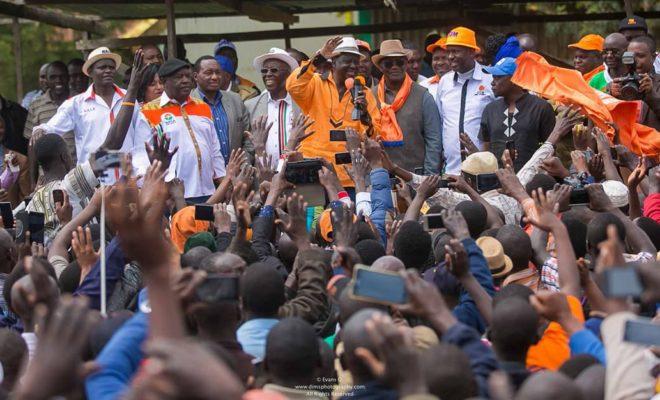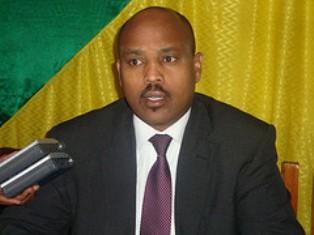Kenya’s election rerun: What happened today. What happens tomorrow.

What matters now is that President Kenyatta demonstrates restraint in dealing with protesters and shows magnanimity in victory.

Opposition leader Raila Odinga addresses supporters at a rally. Credit: Raila Odinga.
From 6am tomorrow morning, many, but perhaps not most, Kenyans will vote in the 26 October re-run of Kenya’s presidential election.
The dramas that have occurred following the landmark Supreme Court ruling annulling the August 2017 vote have been extraordinary. And the situation continues to evolve quickly.
What happened today
Today was just the latest eventful day since the presidential vote on 8 August was invalidated. Three consequential court cases – two before the High Court and one before the Supreme Court – were due to be decided.
The Supreme Court was meant to hear a case calling for the election to be postponed. The petitioners warned of “the risk of exposing a significant population of voters to disenfranchisement” and claimed the Independent Electoral and Boundaries Commission (IEBC) was unable to ensure a free, fair and credible process.
However, in what can only be explained as the result of flagrant interference with the judiciary, the Supreme Court could not obtain quorum. Last night, the driver of the Deputy Chief Justice was shot in mysterious circumstances, preventing her from attending court today. In televised remarks from the court, Chief Justice David Maraga, who appeared on the bench stoic and alone, announced that all but one other judge were also “unavailable”.
In the High Court meanwhile, Justice G. V. Odunga decided judicial review application 628. This case challenged the appointment of 290 constituency and deputy constituency returning officers (CROs and DCROs). The complaint claimed that the IEBC had not complied with electoral regulations requiring consultation with political parties in appointing these officials.
In his ruling, Odunga noted: “the mere fact that a person was appointed as a CRO for a particular Constituency does not necessarily qualify him or her to be suitable as a CRO for another Constituency.”
But he continued to explain that granting the petition’s request would mean that the electoral officers could not preside over tomorrow’s presidential elections. He pointed out that the petitioners had not called for the cancellation or postponement of the vote, and that for the elections “to proceed in the absence of the said officers would in my view constitute a crisis of unimaginable magnitude. Simply put, it would be a recipe for chaos.”
He decided that the IEBC’s failure to follow regulations could be addressed by the competent court after the election, and may, “depending on the weight attached to it warrant the nullification of the election”.
In the third case, also at the High Court, Justice E. C. Mwita reviewed an application demanding a new process of candidate nomination. The judge dismissed the case, saying the “the issues raised in the petition fall within the jurisdiction of the Supreme Court”. It went unsaid that the Supreme Court had been effectively paralysed only this morning.
This evening, Raila Odinga, leader of the opposition National Super Alliance (NASA) responded. He had earlier promised a “way forward” and asked his supporters to convince their friends, neighbours and anyone else to stay away from tomorrow’s polls.
“We shall not participate in a sham election,” he told the crowd. “Hold prayers away from polling stations or just stay at home.”
He went on to outline five points of action: “One, from today, we are transforming the NASA coalition into a resistance movement. Two, we will embark on a further national campaign of defiance of illegitimate governmental authority and non-cooperation with all its organs. Three, boycott the goods and services offered by the businesses whose benefit dictatorship is being established. Four, we shall convene a people’s assembly for the purpose of charting our way back to constitutionalism and democracy. Five, we shall mobilise all progressive forces in the country to ensure that a fresh, free and fair presidential election is organized within 90 days.”
What happened this week: dialogue and delay
Before today, the rising tensions of previous recent weeks had led numerous organisations – from the Carter Center and International Crisis Group to Bloomberg and the FT – to call for a delay to the poll.
As the FT put it, “a pause is needed to allow tempers to cool”. Crisis Group argued: “faced with two bad options – proceeding with a vote despite the boycott of a candidate [Raila] who won some 45 per cent of votes the last time round; or accepting a limited delay – the latter option is the better one.”
However, these calls were always optimistic. President Uhuru Kenyatta and the ruling Jubilee Party, still furious at the Supreme Court’s decision to annul the August vote, were insistent the 26 October poll proceed. The IEBC, riven by division amongst its commissioners, was never in a position to apply to the court for a delay. And given that the commission chairman Wafula Chebukati had asserted, on 18 October, the IEBC’s “full technical preparedness for this election”, it would have been tricky to argue more time was needed on technical grounds.
It is questionable whether deferring the vote by a matter of weeks would really have mitigated tensions and whether authorities would have used the additional time to prepare effectively. The period following the Supreme Court’s annulment does little to suggest either development was guaranteed. This is no longer an electoral crisis. It is a crisis of Kenya’s institutions and political confidence. In the short-term, a further delay was unlikely to resolve underlying grievances.
Calls for dialogue, rather than postponement, were perhaps more vital – even if they went unheeded. The churches, observers and foreign governments all pleaded for talks. But neither side was in the mood to be conciliatory.
For his part, President Kenyatta knows he holds the cards. He is the incumbent, and incumbents usually win. Jubilee is better resourced and organised than NASA ever was. And Kenyatta probably did win the August vote, as evidenced by his support throughout the country, higher turnout in his strongholds, and the strong local performance of Jubilee in local contests. Recall that the Supreme Court attributed no blame to Kenyatta in its decision to annul the election, and did not suggest his margin of victory was in doubt.
What happens tomorrow, and after
Barring an overnight surprise, tomorrow’s vote will proceed. There will likely be active disruption of electoral activities in several, opposition-leaning parts of the country, such as in the west, on the coast, and in parts of Nairobi.
Voter turnout will undoubtedly fall dramatically compared to August, and may be the lowest since the 2002 elections. Given the hurried preparations and the many anxieties amongst electoral staff, the election will objectively be technically worse. President Kenyatta will win the most votes. Most Raila voters will honour the boycott.
Events today confirmed this is no longer a competitive election. What matters now is for the Kenyan state, President Kenyatta and Jubilee to demonstrate restraint in dealing with protestors and show magnanimity in victory.
Kenyatta’s first term was dogged by questions of legitimacy arising from the 2007 post-election violence and his indictment by the International Criminal Court. His legacy as president will ultimately be shaped by the choices made now. It is not always easy to seek accommodation from a position of strength, but to do so would be courageous. It is clearly in the interests of all Kenyans that he choose that course of action.
[Update 2130 East Africa Time 25/10/17: The Court of Appeal has issued an order this evening suspending the decision of Justice Odunga. “We order that the declaration by the High Court that the appointment of the Returning and Deputy Returning Officers was in violation…and the implementation thereof is hereby suspended.”]






